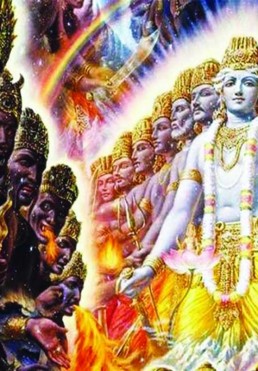Continuing, Lord Krishna enumerates the mental contents of the godly type of men.
HARMLESSNESS (Ahimsa) — It does not consist so much in not causing bodily injury to beings in the physical world, as in not harming any living creature in the world around from the realm of thought. Physical ahimsa is simply impossible. To continue living, some kind of physical harm or the other has to be brought about; it is unavoidable. But even while bringing about unavoidable disturbances around ourselves, if our motives are pure and clean, the harm so wrought is not regarded as causing injury.
TRUTH (Satyam) — We have already discussed this virtue while explaining the last term in the previous stanza “uprightness.”AN EVEN TEMPER (absence of anger — Akrodha) — Sometimes it is rendered as ‘angerless-ness’ which is not very happy. A better rendering would be the capacity to check, at the right time, waves of anger as they mount up in our bosom, so that we do not manifest anger in our actions. It will be almost unnatural to expect the mind to become incapable of anger. But no emotion should be allowed to overwhelm us to such a degree as to render us almost impotent. This anger arises out of an insufferable impatience with others. In short, Akrodha does not mean ‘without anger’ but only ‘keeping, as far as possible, an even temper.’
SPIRIT OF RENUNCIATION (Tyaga) — In this stanza also we find, as we noticed in the previous stanza, that there is a sequential order strictly followed in the development of thought from term to term. If without respect to Truth, we cannot live in the spirit of ahimsa, so also without the spirit of renunciation an even temper is but a vain hope.
PEACEFULNESS (Quietude — Shanti) — If a seeker is capable of living, conscious of Truth harming none, keeping an even temper, in a spirit of renunciation, inspite of all disturbing environments and happenings around, then he is the one who shall come to experience peace and quietude in himself. Even in the midst of a stormy life and outrageous circumstances, such an individual can successfully keep his inward balance and intellectual poise.
ABSENCE OF CROOKEDNESS (Unmalicious tongue — Apaishunam) — The ugliness or beauty of the tongue is ordered by the personality behind it. A shattered entity will seek self-gratification in malicious scandal-mongering, and the soft, fleshy tongue can often become more devastating than the most destructive missile. A seeker who is trying to reach a fuller and more exhaustive self-expression should develop such an inward harmony that his speech should echo the fragrance of his soul. A speech with softness of tone, clarity of expression, honesty of conviction, power of bringing a clear picture in the listener’s mind with no veiled meaning, overflowing with sincerity, devotion and love, becomes the very quality of the autobiography of the speaker’s personality. To develop, therefore, a habit of such speech would be unconsciously training many aspects in ourselves which are all necessary for the perfect disciplining of the inner equipments.
COMPASSION (TENDERNESS) TOWARDS BEINGS — In the society in general, it is not reasonable for a seeker to expect that all will keep up to the ideal that he himself entertains. There will be imperfections around. But to recognise, in and through those imperfections, the Infinite beauty of life expressed, is the secret of enduring tenderness in all Saints and Sages. Love alone can discover an infinite amount of tenderness in us. Unless we train ourselves to see the beauty of life pulsating through even wretched hearts and ugly characters, we will fail to bring forth tenderness to sweeten life within and without.
NON-CONVETOUSNESS (Aloluptvam) — In the subjective life, to live “without covetousness” means controlling our sense-organs from extreme indulgence in sense-enjoyments. An average man has an endless thirst and an insatiable hunger for sense indulgence. To remain in self-control without endless sense-hunger is meant by the term non-covetousness.
GENTLENESS AND MODESTY — These are not so much the particular disciplines of the individual, as the resultant beauty and harmony which an individual brings forth as the fragrance of his culture, in his contacts with the world outside. These two qualities are best seen in one who has established himself in all the above-mentioned noble qualities. The conduct of such a disciplined man will be both gentle and modest.
ABSENCE OF FICKLE-NESS — NOT UNNECESSARILY MOVING THE LIMBS (Achaapalam) — Restlessness of mind and unsteadiness of character are reflected in the physical movement of a person. The body shadows the condition of the mind. A constant restlessness, a sudden outburst of activity, an immodest shaking of the body and voluptuous tossings of the limbs are all noticed only in individuals who have not yet cultivated a steady character and a purposeful personality. These can be seen in a child and there they are even considered as enhancing its beauty. But as an individual grows, the beauty in him is his mastery over himself as declared by his movements.
Shankara explains this as “NOT TO SPEAK OR MOVE HANDS AND LEGS IN VAIN.” This is an extension of the meaning of this term, and implies the promptitude and economy of all physical energy in any efficient activity. Unnecessarily exhausting the muscles with indecisive movements and thoughtless exertions are signs of weakness in the personality. Such individuals are extremely imaginative and miserably weak in their intellectual calibre and emotional vitality. To avoid such movements, therefore, is to cure many simple weaknesses at the various facets of any given personality.
MOREOVER, CONTINUING THE LIST OF DIVINE QUALITIES:

